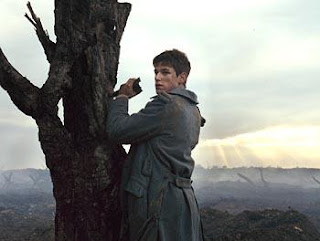
Director: Jean-Pierre Jeunet
Starring: Audrey Tautou, Gaspard Ulliel, Marion Cotillard
Jean-Pierre Jeunet’s A Very Long Engagement is a carefully constructed, beautiful executed film. Starring the engaging Audrey Tautou, baby-faced Gaspard Ulliel, and a pre-Oscar, frighteningly intense Marion Cotillard, this story of lost love, lingering hope, and the brutality of war rises above your standard tales of romantic tragedy to create something genuinely moving and artistically breathtaking. As bitter as it is sweet, as ugly as it is beautiful, as disillusioning as it is hopeful, it is a masterwork on all levels.
It begins with a striking image: a statue of Jesus on the cross, one hand loosened so that the top hangs at an angle with the bottom nailed in place and the mid-section gone completely, having been blown away in the course of fighting. We know immediately with this one shot that nothing is sacred here, that anything even resembling mercy is long gone. Below the statue is the French trench Bingo Crepescule, where five condemned soldiers are being led to await their deaths. All have been sentenced to be executed for self-inflicted wounds, though only four are actually guilty of having sought to injure themselves while the fifth shot himself accidentally. With disgust, one of the officers in charge of carrying out the executions reveals that the condemned men won’t receive a proper execution, but will instead be sent out of the trench and into No Man’s Land, where they will either be killed by the Germans or will succumb to the cold or starvation. Manech (Ulliard), the youngest of the men, has gone mad with shell shock and announces to his fellow soldiers that as soon as the execution is over, he’ll return home to marry his beloved Mathilde (Tautou). Officially, all five soldiers are killed after being sent into No Man’s Land.
In 1920, Mathilde, still hopeful that somewhere Manech is alive, is given a box containing the belongings of the five condemned men. Using the contents as clues, she begins to unravel a mystery which leads her to believe that one of the condemned men, the one wearing German boots, escaped and possibly took another soldier with him. In a parallel story, a prostitute named Tina Lombardi (Cotillard), the girlfriend of one of the condemned men, is conducting an investigation of her own and takes it upon herself to extract justice from those who brought about the deaths of the men. Her methods of murder are inventive and she’s proudly defiant even after she’s caught, discovering only too late (and with the help of Mathilde) that what she’s done for Ange (Dominique Bettenfeld) runs contrary to what he would have wanted.
Though the film focuses primarily on the story of Manech and Mathilde, it also fleshes out the stories of the other condemned soldiers, though none more so than Bastoche (Jerome Kircher), the soldier who was originally in possession of the German boots and whose back story features an appearance by Jodie Foster as Elodie, the wife of Bastoche's best friend, over whom the two will fall out. The stories of the five men serve to drive home the wastefulness of war – in one scene Ange passes two soldiers making crosses for graves and remarks that they must have been hit pretty hard, seeing as there’s so many, only to have the two confess that they’re just getting a head start, implying that the mission Ange is about to take part in is doomed – and the savagery of World War I military politics which sends the five men to their deaths. Manech, in particular, is mentally unfit to be held accountable for his injury, having been so severely traumatised by his experiences. The others, though they’ve retained their mental faculties, are similarly traumatised, their mutilated hands marks of anguish rather than cowardice.
I’m loathe to reveal any more details of the plot since discovering how all the elements come together – particularly ownership of the German boots – is part of the power of the story. In terms of how the plot is framed within the film, it’s refreshing to see a story like this – a war story – played out from a distinctly feminine perspective. The narrator is female, and much of the information Mathilde gets comes from women (Tina, Elodie, the sister of a German soldier, and Vero, Bastoche's girlfriend) acting as inner-narrators . The fact that the investigation is being spearheaded by Mathilde is also of import because it allows A Very Long Engagement to play out like a rewritten version of the Odyssey where instead of a passive, waiting Penelope, we have a Penelope actively seeking out her Odysseus.
As a contrast to the feminine voices that shape the story, Jeunet shows us the horrors of trench warfare. The film opens with the men wading through the muddy trench while other soldiers take cover from the rain as best they can, all looking distinctly miserable. In scenes of active fighting we watch the trench shake under the force of shelling and see part of it collapse, burying a handful of soldiers in the dirt. The ways that people die in this film are horrendous, but the camera remains unflinching, making the story all the more powerful. Fighting from the trenches was an awful, shattering experience and that’s exactly what Jeunet is determined to show.
As Mathilde, Tautou carries the weight of the film on her shoulders. If she fails, the film fails, because we must care about her in order to care about the story’s resolution. Tautou is more than up to the challenge, rendering a plucky and engaging performance that makes Mathilde much more than just “the woman who waits” in this visually stunning, thoroughly engrossing film.
No comments:
Post a Comment